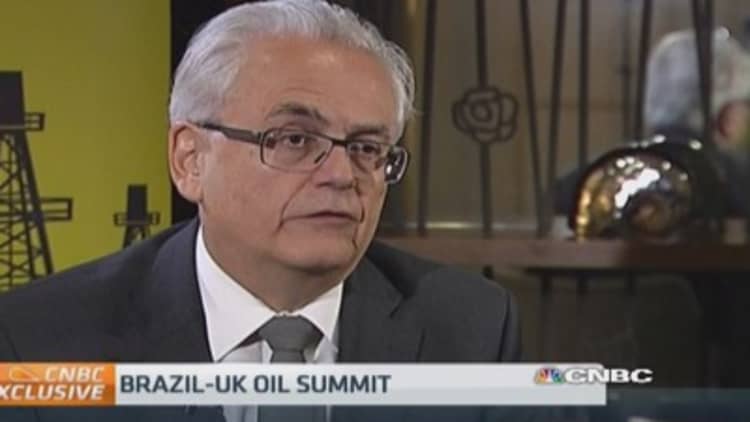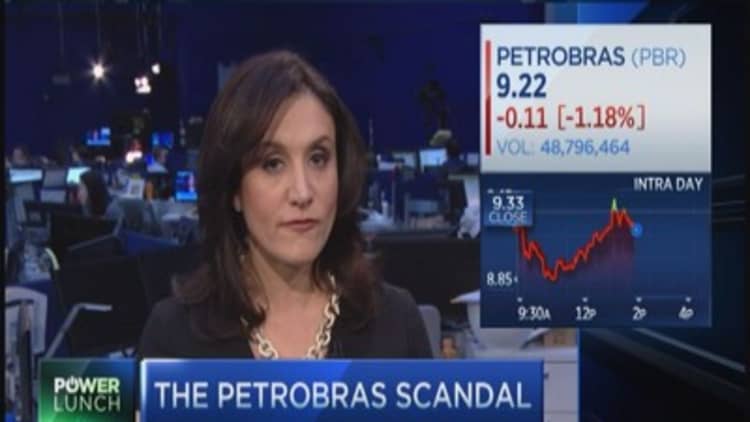Energy giant Petrobras is engulfed in a corruption scandal that could prove to be Brazil's biggest, threatening to engulf the country's most senior politicians—including its president.
Even the company is not downplaying the events. In a news release last week to explain why it had delayed its upcoming financial report, Petrobas said it was "undergoing a unique moment in its history, in light of the accusations and investigations of the "Lava Jato Operation" (Portuguese for "Operation car wash") being conducted by the Brazilian Federal Police, which has led to charges of money laundering and organized crime."
CNBC takes a look at the facts behind the scandal and the implications for other oil companies and Brazil itself.
Petrobras: The background
Petrobras is the world's sixth-biggest energy company by assets, according to Platts, and is involved across the world in the exploration, production, refining and sale of oil and gas. It is a bedrock of the Brazilian economy—to which oil exports are a considerable contributor—and one of South America's best-known companies.
The oil major is state-backed and until 1997 held a monopoly over the Brazilian oil industry. Its close links with government have bolstered its financial security in the eyes of investors and regulators—but have also contributed to its current crisis.
The scandal
Petrobras executives are alleged to have paid politicians for contracts, using money skimmed from company profits. The head of the country's budget watchdog, Joao Augusto Nardes, has said the kickbacks may total as much as 4 billion Brazilian reais ($1.6 billion), according to the Wall Street Journal.
The company has neither confirmed nor denied the allegations. It has hired independent auditors to investigate further, in addition to the official investigation by the Brazilian Federal Police.
The country's most senior politicians are implicated, including recently re-elected President Dilma Rousseff, who previously headed the Petrobras board of directors.
There is no evidence that Rousseff personally benefited from the illegal payments, but the majority of the alleged events occurred while she was head of the board of directors.

Police have arrested senior executives both within Petrobras and in some of the country's largest construction and engineering firms that work with the oil major.
In particular, Brazilian police have charged former Downstream Director Paulo Roberto Costa with money-laundering and organized crime. Costa is currently under investigation for corruption and embezzlement, among other offenses.
On October 8, Costa gave evidence to Brazilian prosecutors in which he stated he had accepted bribes.
Petrobras has delayed its quarterly report until December on the grounds that Costa's declarations in court last month could affect the company's financial statement if proven true.
Financial hit to Petrobras and others companies
Petrobras is highly indebted, but it is unclear when it will be able to return to the bond markets given the sheer size of the scandal.
"Petrobras does have cash, as well as some implicit government support but… This looks ugly," said BBH analysts led by Marc Chandler in a research note on Wednesday.
Read MoreThe big threat facing one oil giant
According to Chandler, the price of Petrobras' benchmark 2024 U.S. dollar-denominated bond is down about 10 percent since its September peak—yields went to 6.1 percent from 4.7 percent.
Ability to refinance is particularly important given Petrobras' massive capital expenditure requirements.
"Some reckon that the company may need more than $15 billion in financing to fund its massive capex projects, planned at about $40 billion for 2015," said Chandler.
As of June 30, Petrobras' debt stood at $170 billion, according to Moody's Investors Service. It downgraded Petrobras' debt rating from Baa1 to Baa2 last month, citing additional concerns about the hit from falling oil prices.
On Friday, Petrobras shares were trading down around 14 percent on the month.
Read MoreTrack Petrobras shares

Other companies associated with Petrobras have also been hit. Fitch Ratings has placed Brazilian heavy construction firms on "negative watch" due to concerns the scandal will lead to contract suspensions.
"The investigation poses reputational and contract risk for companies doing business with Petrobras, including construction firms, energy offshore operators, and shipbuilders. The oil firm has said that contracts affected by inflated pricing would be revised, but not necessarily cancelled," said analysts at IHS in a note on Thursday.
Political fallout
In general, Brazilians are becoming less tolerant of corruption, as demonstrated by the protests in June last year, when millions took to the street to express their anger at government, Congress and political parties.
The Brazilian Senate has ruled that although the majority of the corruption uncovered occurred when Rousseff was head of the Petrobras board, there was no evidence she benefited personally.
This means that she is unlikely to be impeached, according to IHS.
"Rousseff is considered a clean politician and it is very unlikely that she was part of the corruption scheme; her surge in popularity in the early part of her first term was in large part due to the firm stance she took against ministers caught up in corruption scandals," the research provider said.
However, the scandal further undermines Rousseff after she was re-elected by a very narrow margin last month.
Read MoreBrazil's election celebration could be short-lived
Rousseff is already struggling to combat Brazil's deteriorating economy. Brazilian GDP growth fell to 2.7 percent in 2011, the year Rousseff came to power, from 7.5 percent in 2010. The government sees economic growth coming in at only 0.9 percent this year.
"At this point, markets seem very bearish (on Brazil), but we believe they are ready to become even more bearish," said Chandler.

